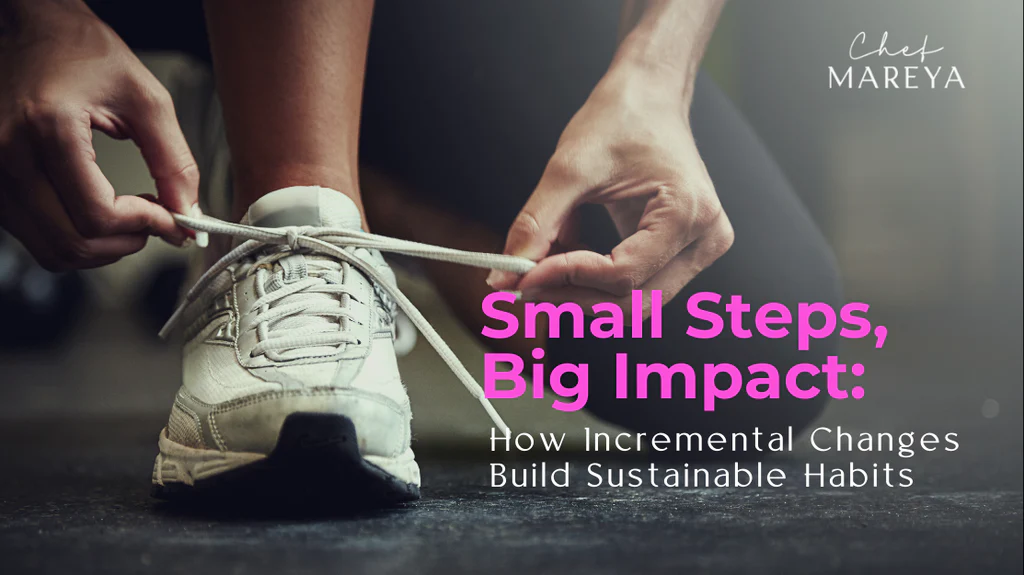Introduction
Lasting change rarely happens overnight. Most of us chase big goals and bold transformations, only to lose momentum after a few days. The real secret to success is much simpler—start small, stay consistent, and let your habits do the heavy lifting. Small habits have the power to transform your life because they build momentum, strengthen discipline, and reshape your identity over time. You don’t need massive willpower to change; you just need small, repeatable actions that fit naturally into your daily routine.
This article explores the science behind small habits, how to create them effectively, and why they lead to powerful, long-term results. You’ll learn proven strategies for making habits stick, avoiding common pitfalls, and aligning them with your goals and values.
Why Small Habits Work
1. They’re Scientifically Proven
Habits are formed through repetition and reward. When you perform an action regularly in a consistent environment, your brain starts to automate it. Over time, it requires less effort and energy. This process—known as “automaticity”—is the foundation of all long-term change. By starting small, you allow your brain to adapt without resistance, turning deliberate effort into effortless behavior.
2. They’re Easy to Start and Maintain
Massive goals feel intimidating, while small habits feel achievable. For example, deciding to “walk for 5 minutes every morning” is easier than “get fit this year.” When a habit is simple and low-effort, it bypasses procrastination and creates quick wins that motivate you to continue.
3. They Build Confidence and Momentum
Each time you complete a small habit, you reinforce your belief in your ability to follow through. This builds self-trust and momentum. Over time, one small success leads to another, creating a snowball effect that makes larger goals possible.
4. They Rewire Your Identity
Real change happens when you start to see yourself differently. Instead of thinking, “I need to become healthy,” think, “I’m someone who takes care of my health.” Small, consistent actions help you embody that identity. Once you see yourself as the kind of person who shows up, change becomes automatic.
The Science Behind Habit Formation
Habits are built through a neurological process called the habit loop, which includes three stages:
-
Cue: A trigger that reminds your brain to start the behavior (for example, waking up can cue brushing your teeth).
-
Routine: The actual behavior or action you perform.
-
Reward: The positive feeling or result you experience afterward, which reinforces the habit.
When this loop is repeated often, your brain associates the cue with the routine, and the behavior becomes automatic.
Studies show it takes an average of 66 days for a new habit to become automatic—but it depends on consistency, not intensity. Missing one or two days doesn’t break the habit; giving up entirely does.
Core Principles of Building Small Habits
1. Start Tiny
Make the habit so small it’s impossible to fail. Instead of committing to read for an hour, start with one paragraph. Instead of doing 50 push-ups, start with one. Success comes from repetition, not size.
2. Use Clear Triggers
Habits stick when they’re tied to specific cues. Attach your new habit to something you already do:
-
“After I brush my teeth, I’ll drink a glass of water.”
-
“After lunch, I’ll take a 5-minute walk.”
This creates a mental link between actions, making it easier to remember.
3. Make It Easy
Reduce friction by preparing your environment. Want to read more? Keep a book on your pillow. Want to exercise? Lay out your workout clothes the night before. The easier a habit is to start, the more likely you are to stick to it.
4. Track Your Progress
What gets measured gets managed. Use a journal, checklist, or app to mark your progress. Seeing a streak build up motivates you to keep going. Missing a day isn’t failure—just restart the next day.
5. Celebrate Small Wins
Reward yourself after completing a habit. A small celebration—like saying “yes!” or mentally acknowledging your effort—strengthens the reward loop in your brain and increases motivation.
Applying the Small Habits Strategy
Step 1: Choose One Area of Focus
Pick one domain of life to improve—health, productivity, mindset, relationships, or finances. Too many changes at once can overwhelm you.
Step 2: Pick One Tiny Habit
Define a single action you can do in two minutes or less.
Examples:
-
Write one sentence each day if you want to become a writer.
-
Meditate for one minute to reduce stress.
-
Floss one tooth if you want to improve oral health.
Step 3: Anchor It to a Trigger
Attach your new habit to a routine you already do daily. The stronger the anchor, the faster the habit forms.
Step 4: Stay Consistent
Do it every day at the same time or after the same cue. Consistency builds the neural connection faster than occasional intensity.
Step 5: Reflect Weekly
Review your progress once a week. What worked? What didn’t? What can you adjust? Self-reflection keeps your growth intentional.
Step 6: Scale Gradually
Once a small habit feels natural, expand it slightly. One push-up can become ten, one sentence can become a paragraph, and one minute can become five. Growth happens naturally once the base habit sticks.
Avoiding Common Pitfalls
-
Starting Too Big:
Trying to change too much at once leads to burnout. Begin with something so small it feels silly. -
Relying on Motivation:
Motivation is unreliable—it rises and falls. Systems and routines are what keep you consistent when motivation fades. -
Forgetting to Reward Yourself:
Positive emotion reinforces behavior. Even a mental “good job” makes your brain want to repeat the action. -
Neglecting Environment:
Your surroundings should make your habits easy. Remove distractions and add visual cues that remind you to act. -
Giving Up After a Miss:
Skipping a day doesn’t erase your progress. Restart immediately. The key is not perfection but persistence.
Building Habits That Match Your Values
The most powerful habits are rooted in your core values. When a habit supports what truly matters to you, it feels purposeful rather than forced.
For example:
-
If you value health, walking daily aligns with that identity.
-
If you value growth, reading each morning supports it.
-
If you value connection, calling a loved one weekly strengthens that bond.
Habits grounded in values create long-term fulfillment because they make your actions meaningful.
The Compound Effect of Small Habits
Small habits might seem trivial, but their impact compounds over time—like interest on savings. Doing something 1% better every day results in massive improvement over months and years. The difference between people who achieve long-term success and those who don’t often comes down to simple, consistent actions repeated daily.
When you stick with small habits, they quietly shape your future. They influence how you think, feel, and act. They help you become the kind of person who follows through, stays disciplined, and achieves goals naturally.
FAQs
Q1: How long does it take to form a new habit?
It varies from person to person, but research suggests around two months of consistent repetition helps most habits become automatic.
Q2: What if I miss a day?
Missing one day doesn’t break a habit—what matters is getting back on track the next day. Focus on progress, not perfection.
Q3: How do I stay motivated to keep small habits?
Attach your habit to something meaningful, track your progress, and celebrate small wins. Purpose and reward build natural motivation.
Q4: Can I build multiple habits at once?
It’s best to master one habit first. Once it feels automatic, gradually add others. Too many changes at once can dilute your focus.
Q5: What are examples of powerful small habits?
Examples include drinking a glass of water after waking, writing three things you’re grateful for daily, or stretching for one minute before bed.
Read More: BottleCrunch.com A Complete Guide to Hosting Insights
Conclusion
True transformation doesn’t come from radical change—it comes from steady, daily commitment to small actions. Each positive habit you build strengthens your discipline, self-belief, and direction. Small habits create structure in a chaotic world; they help you live intentionally rather than reactively. Whether it’s a one-minute meditation, a short walk, or writing one line a day, each micro-habit carries the power to reshape your life.
Remember, success is not about doing more; it’s about doing what matters—consistently. Start today with one simple action, repeat it tomorrow, and let time do the rest. The future you’re building begins with the smallest step you take today.










